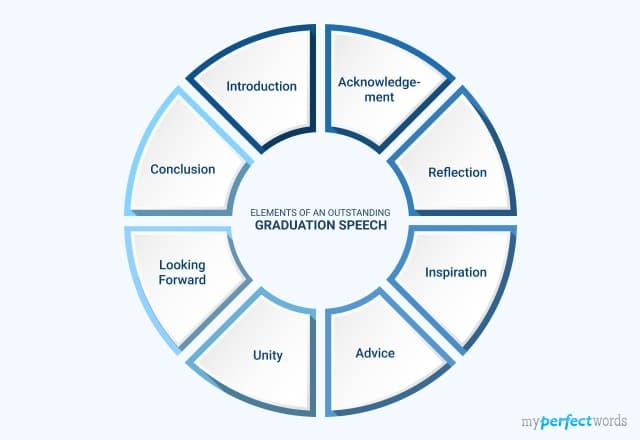
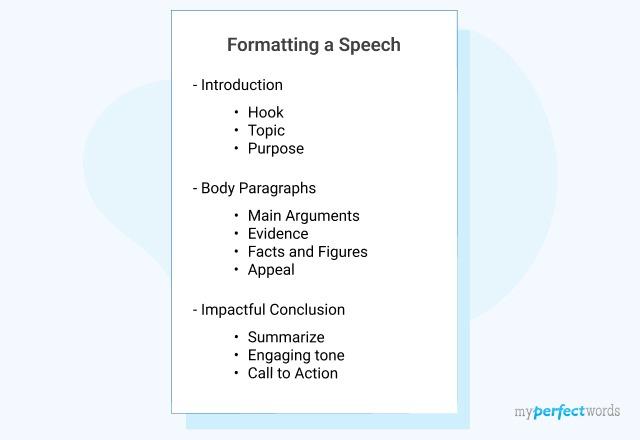
Writing a speech can be stressful and confusing for many people. Feeling lost and overwhelmed without a clear plan can make the task even harder.
But learning the basics of speech format can make it easier and even enjoyable. This guide will show you step-by-step how to write great speeches with examples and templates.
On This Page![]()
- 1. How to Write a Speech Format?
- 2. Speech Format Examples for Different Academic Levels
- 3. Speech Formats For Different Types of Speeches
- 4. How to Rehearse a Speech?
How to Write a Speech Format?
Speech writing gives you a chance to leave an everlasting and meaningful impression on the audience. You might have always believed that you are not good at public speaking. And speech writing may bring you out in cold sweats, but this is different.
Let’s see how one should write a great speech that engages the audience.
Step 1 - Decide the Purpose of Your Speech
To understand the purpose of your speech, consider these queries:
- What is the main motive behind it?
- Is it to inform or persuade? Is it to entertain or demonstrate? Or is it a combination of these?
- What do you want to achieve with your speech?
- Do you want your audience to act upon something, or do you want to convince them to believe what you are saying?
Your answer to all of these questions will decide the organizational structure, type of speech, tone, and content as well.
Identify your listeners and decide which type of speech is suitable for your targeted audience. If you are going to deliver a speech at a wedding, write a special occasion speech. Similarly, if your motive is to persuade the audience, you’ll have to write a persuasive speech.
Step 2 - Choose a Speech Topic
Choose an effective speech topic that catches the audience’s attention immediately. A good speech topic is your first step to impress the audience.
You can select any topic according to the type of speech you need to deliver. Pick a motivational speech topic if you want to get the audience to act upon your message. If you want to make your audience laugh, decide on an entertaining speech topic.
Step 3 - Conduct Research
Conduct thorough research on your particular subject to collect relevant material. Finding credible and updated material is crucial, as good research is the backbone of sound speech.
Before you write your speech, you need to know what your speech will be about exactly. And how long it needs to be, i.e., 5 minutes or 30 minutes long. So, always collect the data according to the time limit.
For a 5-minute speech, you only need a brief material. Your speech should revolve around the central idea. If your speech is 30 minutes long, you need to collect enough details to cover in 30 minutes.
Step 4 - Create an Outline
Now that you have the material for your speech, craft an outline to organize your material. Drafting an outline at first always saves precious time.
Write keywords in the outline that prompt you to remember what you’ll include in your speech. Having an outline for your speech is like having a road map that guides you throughout the speech delivery.
As mentioned before, the basic speech outline format consists of three things:
- Introduction
- Body
- Conclusion
Here is a speech outline template that you can use while crafting an outline for your speech.
Step 5 - Write a Strong Introduction
An introduction will give a brief overview of what you are going to tell your audience. Here are the five things that you should include in your introduction paragraph.
- Greetings and Your Introduction
Decide how you are going to greet your audience and how you will introduce yourself to the audience. You can start with a fact, a quotation, posing a rhetorical question, or even with one-liner humor.
Keep in mind that whatever you start with, must be related to your topic and suitable for your audience.
- A Precise Thesis Statement
A thesis statement is a brief summary of your speech, and it provides the main message of your speech.
- Your Credibility
You need to establish your credibility to make your speech effective. Cite your expertise and qualification that gives you the right to speak about your speech topic.
- Brief Overview
Briefly tell your audience what you are going to share so that they have an idea of what to expect from your speech.
- Benefits of Listening to Your Speech
Convince your audience why they should listen to you. Tell them what's in your speech for them and why should they pay attention. Give them reasons and be specific about the benefits.
Step 6 - Write a Detailed Body
The body of your speech is where you will write the details of what you want to share with your audience. Generally, the body section has three main points, but it can have more than 3 points.
It is always a good idea to be specific and inform the audience of only essential things.
Quite frankly, if you introduce the audience to an abundance of ideas or topics, they might not remember them all! To leave a lasting impact, decide on 2 or 3 ideas, so the crowd remembers them all!
While crafting the body section of your speech, you should keep the following things in mind:
- Choose the three strongest points that describe your topic efficiently.
- Always provide supporting examples. Make sure that the evidence you provide matches the type of speech you are going to write.
- Use transition phrases to make a logical connection between the details.
- Use visual aids like images, graphs, or tables to help your audience understand your topic better.
- Keep the sentence structures in check. Make sure there are no grammatical errors and follow an engaging tone.
Step 7 - Craft a Memorable Conclusion
The final section is the conclusion that sums up the whole speech. Here is how you can write an effective speech conclusion that summarizes and draws all the details together:
- Summarize all the main points
- Restate the thesis statement to reinforce your message
- Remind the audience about the benefits they’ll get if they carry out what you have proposed.
- Provide a call to action at the end of your speech
Step 8 - Format and Polish Your Speech
After the final draft, the next step is editing and formatting. Read your speech aloud and check the flow and organization of the information. Refine the draft by removing unnecessary things and correcting any grammatical mistakes.
Proofread your speech to make sure it contains all the vital information. Correct the structure if needed, and ensure that your speech is free from all kinds of mistakes. Revise your speech as many times as possible.
Now, let’s take a look at some comprehensive speech format examples for multiple academic levels and various occasions.
Speech Format Examples for Different Academic Levels
Follow these speech examples to learn how to properly format a speech and easily get through the speech-writing process.
Speech Formats For Different Types of Speeches
When preparing a speech, understanding the format suitable for your specific occasion is crucial. Different types of speeches require different structures to effectively convey your message and engage your audience.
Here are some sample formats for kinds of speeches:
Speech Formats For Different Occasions
Different occasions call for different types of speeches, each with its unique structure and style. Knowing how to format your speech for the occasion helps to make your speech memorable.
Here are a few speech templates made according to specific events:
Want to see some outstanding speech examples? Head over to our detailed blog!
How to Rehearse a Speech?
Rehearsal plays an important role in delivering an effective presentation. You need to practice a lot to be confident with your speech and deliver it perfectly. Here is how you can do it efficiently:
- Set the time on the stopwatch that is going to be allocated to you. You need to finish your speech within the allocated time.
- Read your speech out loud. Hearing yourself will help you familiarize yourself with the flow of your speech quickly. Remove or change the phrases that sound awkward, and fix the organization of information.
- Practice in front of the camera or a mirror as you have to work on your expressions. It will help you control:
- Your habitual unconscious gestures
- Irregular breathing because of long sentences
- Taking breaks or pauses at the wrong places
- The body posture
- Raising or dropping the voice
- Repeated fillers, i.e., umm, err, uhh, etc
- Lack of smiling and eye contact
- Tone variation
- Your habitual unconscious gestures
- If you experience any problems, stop and fix the problem before starting again from where you left off.
- Make notes of where you need to remember to do something. It will help you improve your speech delivery.
- If possible, do a proper dress rehearsal at the actual venue in front of a bunch of friends. It will help you to get comfortable with the dress, stage, and actual presentation situation.
If you’ve plenty of time, rehearse at least three times or more, before the final presentation. The more you do the rehearsals, the more you build up your confidence and the easier it becomes to deliver your speech.
Now, let’s take a look at some comprehensive speech format examples for multiple academic levels and various occasions.
Wrapping it up, if you came up with a speech after following the guide, you should be able to grab the attention of the audience within seconds!
This guide contains all the essentials to crafting a compelling speech and presenting it in a meaningful way!
However, if you still need some help, you can pay somebody to do my essay. Our service provides top-notch speeches at cheap prices.
You can request your speech at our service and get expertly crafted speeches to impress your audience.
So why wait? Hire our speech writing service and let our experts handle your speech-writing needs!

Write Essay Within 60 Seconds!
Use our AI tool to generate high quality essay
WRITTEN BY
Barbara P
Dr. Barbara is a highly experienced writer and author who holds a Ph.D. degree in public health from an Ivy League school. She has worked in the medical field for many years, conducting extensive research on various health topics. Her writing has been featured in several top-tier publications.
Keep reading
The 10 Key Steps for Perfect Speech Writing

How to Start A Speech - 13 Interesting Ideas & Examples

20+ Outstanding Speech Examples for Your Help

Common Types of Speeches that Every Speechwriter Should Know
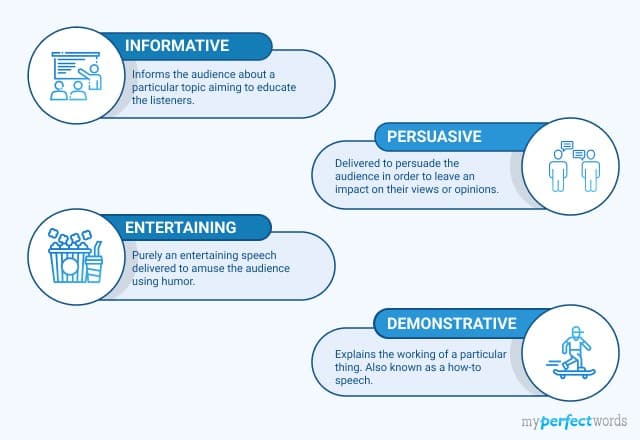
Good Impromptu Speech Topics for Students

Entertaining Speech Topics for Your Next Debate

Understanding Special Occasion Speech: Types, Steps, Examples and Tips
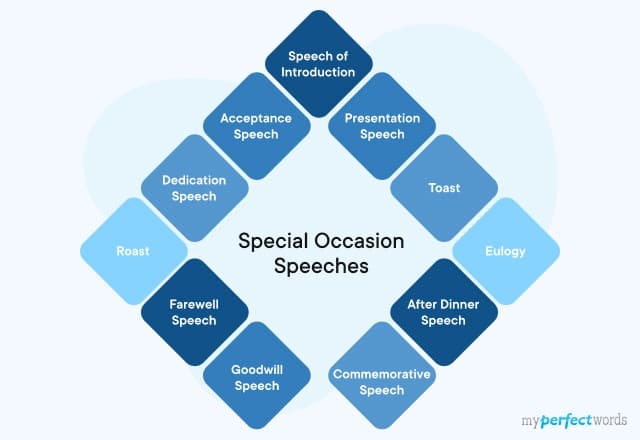
Introduction Speech- Tips & Examples

How to Write A Good Acceptance Speech?

Writing A Presentation Speech In English: Tips And Examples

Commemorative Speech - Writing Guide, Outline & Examples
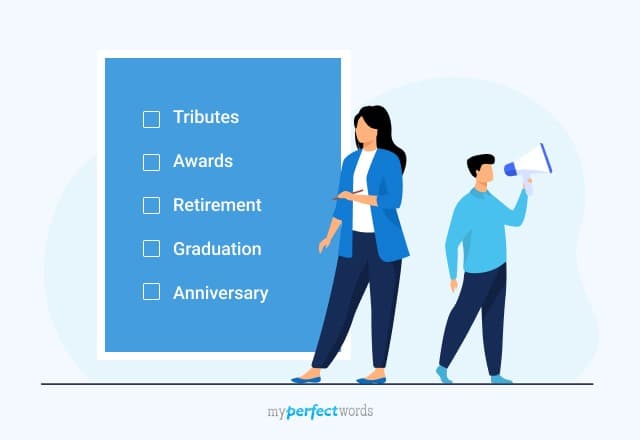
Farewell Speech | Writing Tips & Examples

How to Write an Extemporaneous Speech? A Step-by-Step Guide

A Graduation Speech Writing Guide with Examples
